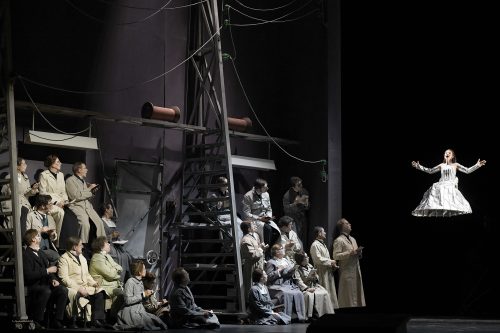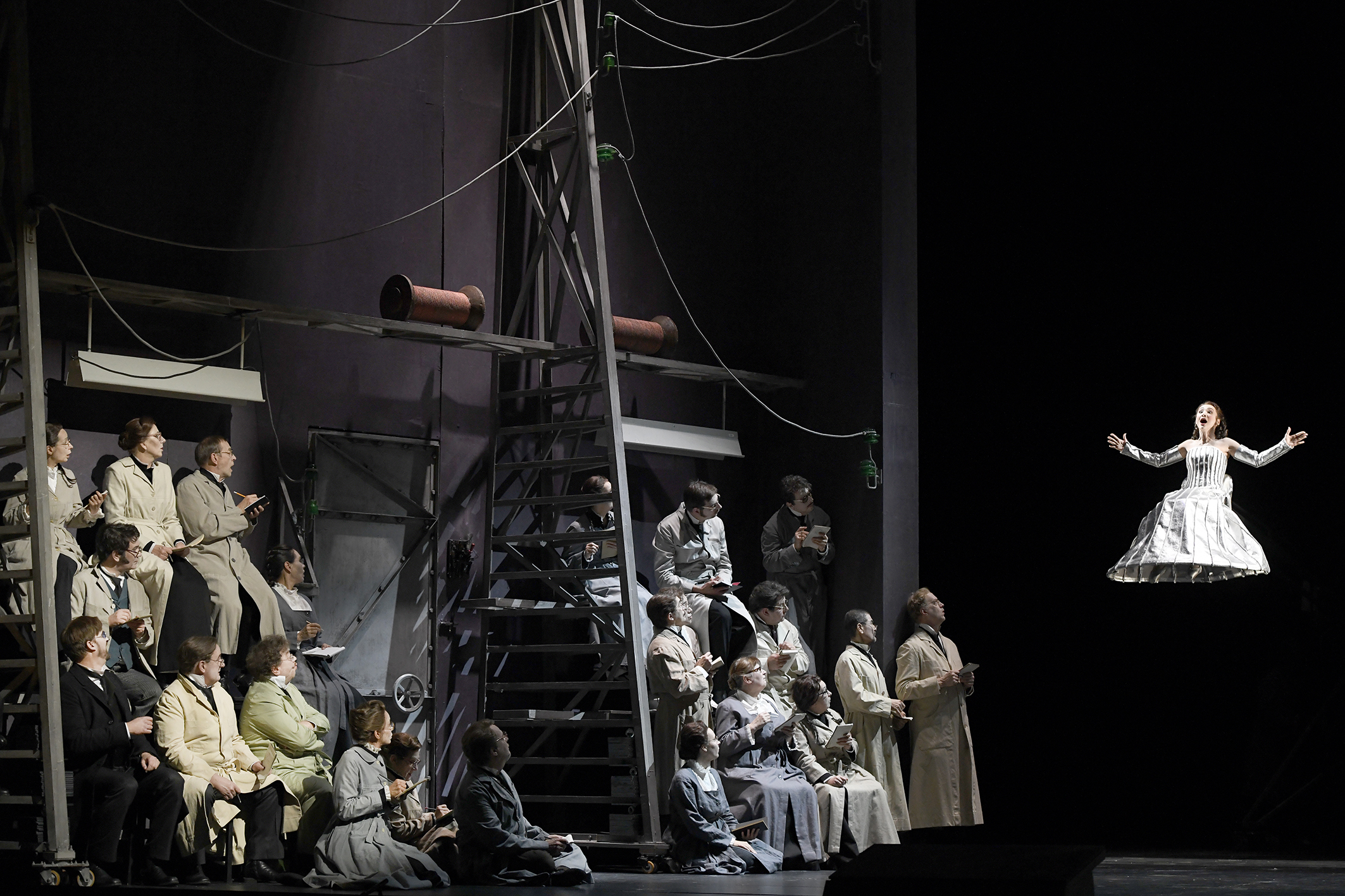 Germany Offenbach, Les contes d’Hoffmann: Soloists, Chorus (chorus master: Jeremy Bines) and Orchestra of the Deutsche Oper, Berlin / Daniel Carter (conductor). Deutsche Oper, Berlin, 24.10.2019. (MB)
Germany Offenbach, Les contes d’Hoffmann: Soloists, Chorus (chorus master: Jeremy Bines) and Orchestra of the Deutsche Oper, Berlin / Daniel Carter (conductor). Deutsche Oper, Berlin, 24.10.2019. (MB)

Production:
Director – Laurent Pelly
Revival Director – Christian Räth
Designs – Chantal Thomas
Lighting – Joël Adam
Video – Charles Carcopino
Dramaturgy – Agathe Mélinand, Katharina Duda
Cast:
Hoffmann – Marc Laho
Stella, Olympia, Antonia, Giulietta – Heather Engebretson
Lindorf, Coppélius, Miracle, Dapertutto – Byung Gil Kim
Muse, Nicklausse – Irene Roberts
Andrès, Cochenille, Franz, Pitichianaccio – Andrew Dickinson
Mother’s Voice – Ronnita Miller
Spalanzani – Jörg Schörner
Luther, Crespel – Andrew Harris
Hermann – Matthew Cossack
Schlemihl – Timothy Newton
Natanael – Ya-Chung Huang
It is a strange piece, The Tales of Hoffmann. I can only speak from my own experience, but, irrespective of performance, irrespective of production, irrespective of textual issues, it never quite seems to come off. Perhaps it is that, as a friend said to me last night, it is too ambitious. That seems to me a better emphasis than ‘problematical’, though arguably the distinction in meaning is negligible. It also points, as that wise and learned friend went on, to the opera’s charm: a more fragile and yes, perhaps, problematical beast, given scale and forces, than the more intimate, often acutely satirical opéras bouffes with which Offenbach is more naturally bien dans sa peau.
Something could – should – be done with those and other tensions, with the work’s metatheatricality, with the fantasy of a work that, after all, is designated an opéra fantastique. Laurent Pelly, alas, would not seem to be the director for any of that. If there is nothing especially wrong with his production, new last year, nor is there anything especially right with – or, better, compelling to – it, either. There are handsome, if highly conservative, set and costume designs (Chantal Thomas, with assistance from Jean-Jaques Delmotte in the latter case), accomplished revival direction and Spielleitung (Christian Räth and Eva-Maria Abelein), and that is about it. Of questions arising from writing an opera based on a play about a writer we have nothing; of any subtexts, be they political, aesthetic, sexual, anything at all, nothing; of a critical standpoint, nothing; of anything approaching modern, let alone contemporary, theatre nothing; and so on, and so forth. There was not even anything in the way of spectacle; unless, out of desperation, you were to count a large video projection of Antonia’s mother’s face, to accompany her voice from beyond. Were this the nth revival, replete with a new lick of paint, of something in the repertory for four or five decades, one might think something once present had been lost; in this case, it is difficult to escape the conclusion that Pelly had presented precious little to get one’s teeth into in the first place. There is so much more potentially here – one need not look elsewhere – than is acknowledged by so reactionary a standpoint. Just when I thought there might be the glimmerings of a concept, however circumscribed, in the Olympia act, seeing the mechanical doll’s visible stage apparatus, it turned out to be no such thing: sometimes visible stage apparatus is just somewhat unfortunately visible stage apparatus. One can recognise and celebrate the skilled work of all involved backstage – true, valuable skills – while wishing it had been put in the service of something more interesting. The version employed had its virtues and its problems; I shall leave them for another day.
If there was little in the way of theatrical interest, however, there was much to admire musically. This was the first time I had heard Daniel Carter conduct, but I hope it will not be the last. If I say that his conducting did not attract attention to itself, I do not intend to imply that it was dull, far from it; rather, there was a rightness to his choices of tempo, of balance, and everything else that fed the illusion was ‘simply’ hearing Offenbach. The Deutsche Oper’s orchestra and chorus proved estimable partners in crime: incisive, fantastical, wry, full of body as required. French vocal style seems a well-nigh impossible thing for modern, international – even modern French – casts to bring off; or perhaps my expectations are at fault. That said, there was an uncommonly high success rate with the language: never something to be taken for granted. And if some singing tended unduly towards the Italianate, it was not so difficult to enjoy it for what it was. Marc Laho and Heather Engebretson worked tirelessly in the central roles, both vividly communicative, the latter distinguishing and yet combining the demands of her various characters with great success – and scoring higher in the stylistic stakes than most. Byung Gil Kim’s bass-baritone proved a joy from beginning to end; darkly suave, this is surely a Don Giovanni in the making, perhaps already made. Moreover, I can imagine Boris Godunov knocking on the door a few years down the line. Irene Roberts’s Muse and Nicklausse were beautifully, honestly sung and acted throughout: another artist from whom I hope to see and hear more. Andrew Dickinson and – offstage – Ronnita Miller also shone; as, highly creditably, did the excellent tenor, Ya-Chung Huang in the role of Natanael. There were no weak links, though; and, as so often, at this house, a proper sense of company. If only there had been a production to match.
Mark Berry
